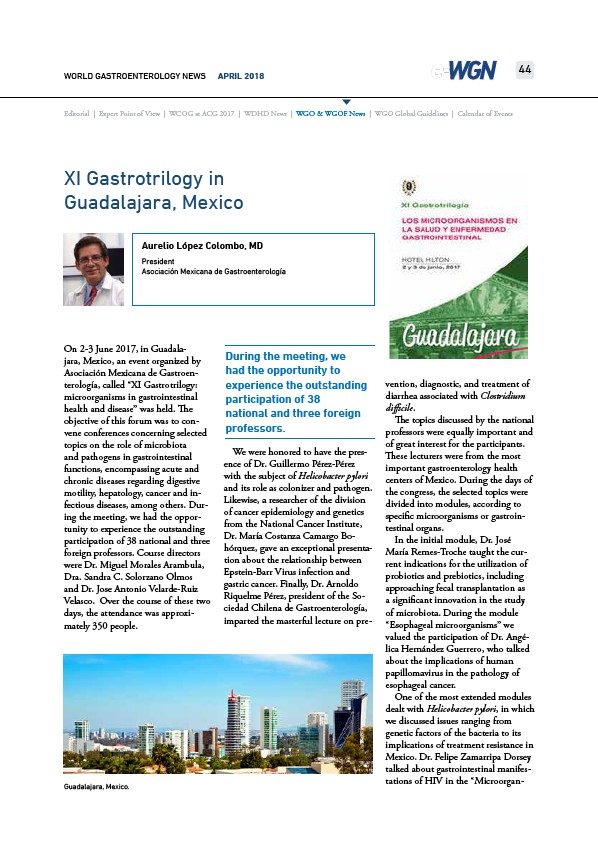
44
WORLD GASTROENTEROLOGY NEWS APRIL 2018
Editorial | Expert Point of View | WCOG at ACG 2017 | WDHD News | WGO & WGOF News | WGO Global Guidelines | Calendar of Events
XI Gastrotrilogy in
Guadalajara, Mexico
Aurelio López Colombo, MD
President
Asociación Mexicana de Gastroenterología
On 2-3 June 2017, in Guadalajara,
Mexico, an event organized by
Asociación Mexicana de Gastroenterología,
called “XI Gastrotrilogy:
microorganisms in gastrointestinal
health and disease” was held. The
objective of this forum was to convene
conferences concerning selected
topics on the role of microbiota
and pathogens in gastrointestinal
functions, encompassing acute and
chronic diseases regarding digestive
motility, hepatology, cancer and infectious
diseases, among others. During
the meeting, we had the opportunity
to experience the outstanding
participation of 38 national and three
foreign professors. Course directors
were Dr. Miguel Morales Arambula,
Dra. Sandra C. Solorzano Olmos
and Dr. Jose Antonio Velarde-Ruiz
Velasco. Over the course of these two
days, the attendance was approximately
350 people.
We were honored to have the presence
of Dr. Guillermo Pérez-Pérez
with the subject of Helicobacter pylori
and its role as colonizer and pathogen.
Likewise, a researcher of the division
of cancer epidemiology and genetics
from the National Cancer Institute,
Dr. María Costanza Camargo Bohórquez,
gave an exceptional presentation
about the relationship between
Epstein-Barr Virus infection and
gastric cancer. Finally, Dr. Arnoldo
Riquelme Pérez, president of the Sociedad
Chilena de Gastroenterología,
imparted the masterful lecture on prevention,
diagnostic, and treatment of
diarrhea associated with Clostridium
difficile.
The topics discussed by the national
professors were equally important and
of great interest for the participants.
These lecturers were from the most
important gastroenterology health
centers of Mexico. During the days of
the congress, the selected topics were
divided into modules, according to
specific microorganisms or gastrointestinal
organs.
In the initial module, Dr. José
María Remes-Troche taught the current
indications for the utilization of
probiotics and prebiotics, including
approaching fecal transplantation as
a significant innovation in the study
of microbiota. During the module
“Esophageal microorganisms” we
valued the participation of Dr. Angélica
Hernández Guerrero, who talked
about the implications of human
papillomavirus in the pathology of
esophageal cancer.
One of the most extended modules
dealt with Helicobacter pylori, in which
we discussed issues ranging from
genetic factors of the bacteria to its
implications of treatment resistance in
Mexico. Dr. Felipe Zamarripa Dorsey
talked about gastrointestinal manifestations
of HIV in the “Microorgan-
During the meeting, we
had the opportunity to
experience the outstanding
participation of 38
national and three foreign
professors.
Guadalajara, Mexico.